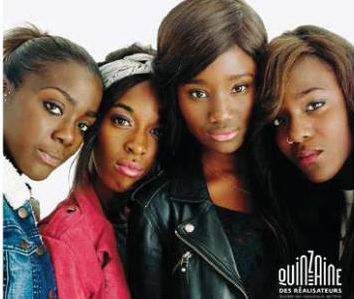Netflix’s ‘Girlhood’ an outdated coming-of-age story

June 2, 2015
Coming-of-age stories about black girls can’t seem to grow up.
Last fall, French director Céline Sciamma, writer and director of nontraditional coming-of-age dramas “Water Lilies” and “Tomboy,” released a teaser for her newest film, “Bande de Filles,” or “Girlhood” in English. The simple teaser went viral — a camera panning down a line of black girls leaning on each other’s shoulders. The girls laughed to an indecipherable dialogue that viewers couldn’t hear over the electropop score.
Sciamma appeared to have created something new and refreshing by featuring an all-black girl cast. However, “Girlhood,” which Netflix added to its streaming service on May 19, is less atypical than it initially appeared.
The film centers on Marieme (Karidja Touré), a quiet black girl living in the banlieue — low-income housing projects in France. Marieme is quiet, failing in school and living in fear of her abusive older brother, Djibril (Cyril Mendy). In the first half of the film, she joins a girl gang led by Lady (Assa Sylla), a character who is equal parts bravado and vulnerability. In the second half of the film, Marieme leaves home and her friends to become a drug dealer.
Sciamma visually outdoes her previous films with “Girlhood,” opting for a more stylized and cinematic look than her usual gritty realism. The film is colored with warm blues and yellows, and her adept camera direction highlights the changes Marieme goes through – from earlier reveals of her sitting outside the frame, almost like wallpaper, to later shots of her front and center, actively driving her scenes forward.
But stunning cinematography does not distract from the film’s content, which takes a sharp turn midway through. The almost idyllic setup of a girl finding friendship with a crew no more dangerous than The Cobras from “The Karate Kid,” and falling in love with her neighbor Ismael (Idrissa Diabaté), awkwardly transitions into a story about poverty and abuse. Audiences have seen similar young black girls stripped of their innocence in films like “Save the Last Dance,” which features a teenage mother, and “Yelling to the Sky,” with an abusive parent, gang violence and drug dealing.Infamously, “Precious” is a combination of almost all of these stereotypical tropes.
According to writer Fanta Sylla, one of the few French black women to review “Girlhood,” the film did little to step outside the oppression narrative of black girls in the banlieue genre.
“Suburban black girlhood has been the subject of a few films (“La Squale,” “Ain’t Scared”) and all of them reduce their black female characters to their social position,” she wrote for Black Girls Talking.
She added that “Girlhood” is not groundbreaking because it adheres to a preexisting narrative that is only interested in urban black girls as victims.
Toronto filmmaker Lu Asfaha also said this narrative has run its course.
“The more often we see [black girls as victims], or any stereotype for that matter, the harder it is for audiences to accept that other characters and stories exist,” she said.
Part of the problem is that studios are reluctant to produce films about black girls at all.
Dee Rees wrote and directed the independent film “Pariah,” which premiered at the 2011 Sundance Film Festival. The film is about a black girl embracing her lesbian identity, and Rees has spoken about the difficulty of finding funding.
“We’d go to pitch meetings and the moment we said ‘black, lesbian, coming-of-age,’ they would turn around, validate our parking and hand us a bottle of water,” she said in an interview with Colorlines magazine.
Zeba Blay, Culture Writer for The Huffington Post, said that films about black girls are rarely made because “we live in a society where black girls aren’t seen as ‘girls.’” Black girls, Blay said, are not ascribed the same innocence as children of other races, in both film and real life.
“Black girls [are not] afforded the chance to make mistakes, explore or grow during teendom,” Blay said.
To counter this perception, the “Carefree Black Girl” movement has spawned on social media. People share pictures and videos of quirky, real and celebrity black girls (think Willow Smith) and show them without judgment or the burdens of society.It’s a celebration of innocence and freedom from this victimhood narrative.
Near the end of “Girlhood,” Marieme and her friends retreat to a hotel room.
“Remember that time we went to Disneyland?” Marieme asks, reminiscing about a scene viewers never see.
“I stopped and watched you,” she tells them. “You were happy. You were beautiful.”
It’s a shame Sciamma chose not to make that film instead.


